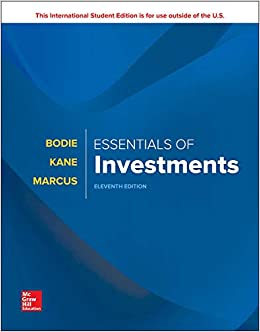Question
Question: Need answer for the below Business Finance Question: Work Problem Consider the following balance sheet: Assets Current assets $38,000,000 Net plant, property, and equipment$101,000,000
Question:
Need answer for the below Business Finance Question:
Work Problem
Consider the following balance sheet:
Assets
Current assets $38,000,000
Net plant, property, and equipment$101,000,000
Total Assets$139,000,000
Liabilities and Equity
Accounts payable $10,000,000
Accruals$9,000,000
Current liabilities $19,000,000
Long term debt (40,000 bonds, $1,000 face value) $40,000,000
Total liabilities $59,000,000
Common Stock (10,000,000 shares) $30,000,000
Retained Earnings$50,000,000
Total shareholders equity $80,000,000
Total liabilities and shareholders equity$139,000,000
This company's stock is currently selling for $7.50 per share and the bonds are selling for $889.50 per bond. These bonds' yield to maturity is 7.6%. The beta for this company is approximately equal to 1.1. The yield on a 6-month Treasury bill is 3.5% and the yield on a 20-year Treasury bond is 5.5%. The expected return on the stock market is 11.5%, but the stock market has had an average annual return of 14.5% during the past five years. This company is in the 40% tax bracket.
- What is the cost of equity? [Answer hint:Cost of Equity = Risk Free Rate + beta (Exp. Market Return - Risk Free Rate); Let's arbitrarily use the US 20-yr bond as proxy for risk free rate ]
- What is the after-tax cost of debt? [Answer hint: Bonds Yield to Maturity (1-tax %) = after-tax debt cost.]
- What are the weights on debt and equity? [Answer hint: Market value of stock = Stock price x number of shares outstanding; Market Value of Debt = bond price x number of bonds outstanding; Weight On Equity = Market Value of Stock / (Market Value of Stock + Market Value of Bonds); Weight On Debt = Market Value of Debt / (Market Value of Stock + Market Value of Bonds)
- What is the Weighted Average Cost of Capital? [Answer hint: WACC = (Weight On Debt) * (After Tax Cost of Debt) + (Weight on Equity) * (Cost of Equity); or in other words WACC = Part of answer to Q3 * Answer to Q2 + Part of answer to Q3 * Answer to Q1
Step by Step Solution
There are 3 Steps involved in it
Step: 1

Get Instant Access to Expert-Tailored Solutions
See step-by-step solutions with expert insights and AI powered tools for academic success
Step: 2

Step: 3

Ace Your Homework with AI
Get the answers you need in no time with our AI-driven, step-by-step assistance
Get Started


